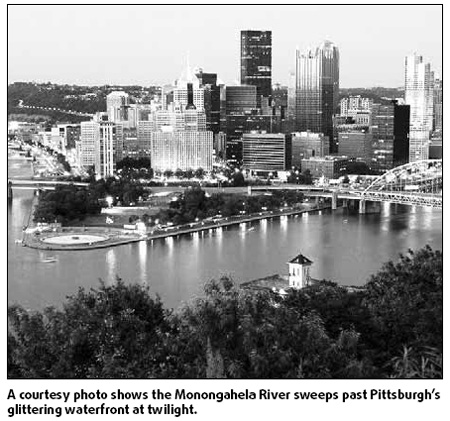
|
WORLD> America
 |
|
Pittsburgh pulls up socks as it prepares for G20 summit
By James Ritchie (China Daily)
Updated: 2009-09-23 09:09
 PITTSBURGH: A city that has fought back from the depths of hard times hopes to show the rest of the world what recovery is as world leaders converge on Pittsburgh to discuss the world financial crisis at the Group of 20 summit starting tomorrow. As 20 heads of state, 3,500 journalists and swarms of security and diplomatic personnel descend on Pittsburgh this week, edgy residents expect to weather some inconvenience for a couple of days.
City, county and state officials last week released Pittsburgh's transportation safety plan for the event, a plan that involves closing the downtown area's central business district to most vehicle traffic. Rather than navigating around the Secret Service's security perimeter, some downtown workers plan to stay away. Hill's wife, for instance, will avoid her office in a downtown high-rise and plans to work from home for the two days of the summit. Hill, a professor at the University of Pittsburgh's law school, three miles away from downtown, will get the day off as his university closes during the event. Visit Pittsburgh, a tourism promotion agency for the area, has predicted a direct economic impact of as much as $35 million on the region from the summit. "There will be some disruptions during the two days of the event," said Dennis Yablonsky, CEO of the Allegheny Conference on Community Development, which promotes economic development in the region. "But it's going to be manageable. We certainly think it's going to be worth it." The city is preparing for protests, on issues such as capitalism and the environment, that are inevitable with a G20 event. "Most of the protests are going to be peaceful and legal, though it's possible there could be some that are chaotic," said Paul LeBlanc, a history professor at La Roche College. "I don't anticipate violence. If it happens, that will undermine the ability of people to get their ideas and opinions across." Economically, Pittsburgh is faring better than other cities. Once a center for steel and other heavy industry, Pittsburgh entered a decline in the 1970s and 1980s, losing jobs and population. In the last 15 years though, it has mounted a comeback in areas such as health care, biotechnology and financial services. Yablonsky and other officials believe the symbolism of the city's economic transformation is a big reason President Barack Obama chose Pittsburgh for the summit. Pittsburgh's environmental record also likely played a role in the administration's choice for the city to host the summit. Once known as the "Smoky City" because of its industrial pollution, the city now ranks among the top 10 in the United States for green-certified building space, according to the Pittsburgh G20 Partnership, a group of organizations planning the event. Pittsburgh residents are somewhat amused by the tone of recent media coverage. "While we're moving in the right direction, we feel like we're at the beginning of the process - and happy to finally be there," Hill said. "The idea that we're done is foreign to people here." James Ritchie is a freelance writer for China Daily's US edition |